Last week, in the Major Introduction Series - Business and Pan-Business (Part one), Mr. Xu, College Concelor at Lucton School Chongqing, introduced the three popular business majors of Accounting, Finance and Financial Mathematics. Today, he will continue to bring us an introduction to business majors such as Marketing, Business Management, Human Resource Management and Economics.

Marketing
If you want to promote and sustain your business development by attracting and retaining customers, then a marketing major is a perfect choice. By majoring in Marketing, you will focus on learning about market research, communication and marketing strategies. A company's marketing department is responsible for tasks such as product promotion or consumer research in order to promote product sales, build brand awareness and customer retention

Basic knowledge: Mathematics, statistics, writing, computing, written and oral expression and the ability to communicate with people.
Core courses: Consumer Behaviour, Digital Marketing, Economic Principles, Investment Analysis, etc.
Future development: There is a huge market demand. The vast majority of graduates work in companies such as insurance, equities, securities and real estate, mainly in sales, marketing and management departments. Specific positions include marketing manager, marketing coordinator, product development, etc.
Entry requirements of degree in Business with Marketing in the University of Edinburgh

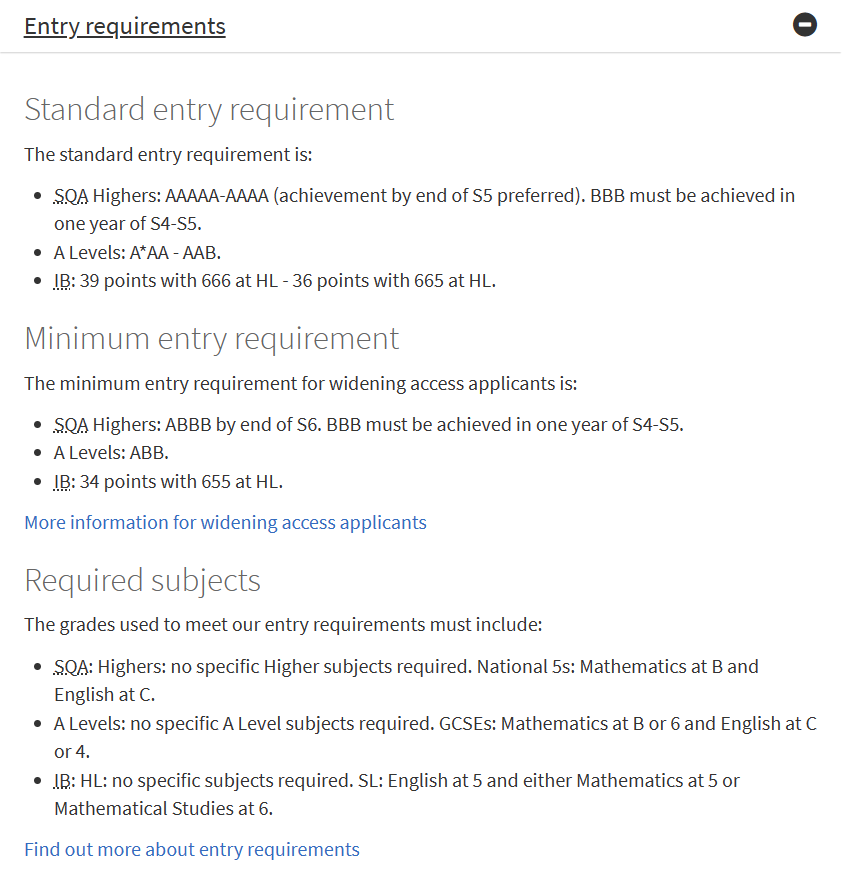
• GCSE: English at C or 4, Mathematics at B or 6
• A-Level: A*AA - AAB
• Suggestions for subject choice: Mathematics, Business Studies or Economics
曼切斯特大学管理学
Entry requirements of degree in Management (Marketing) in the University of Manchester

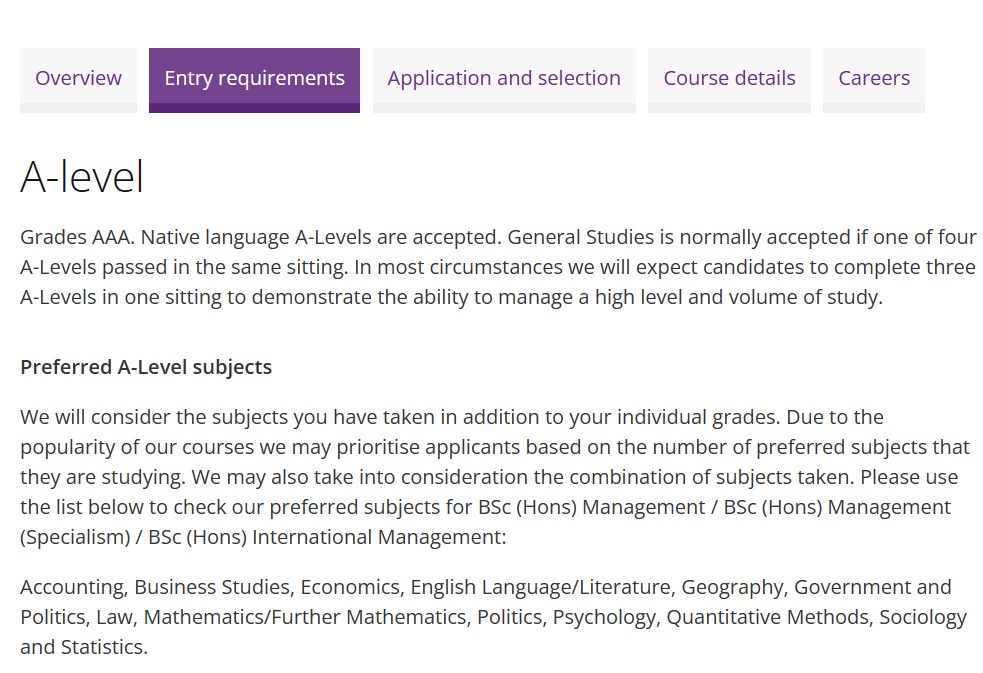
• GCSE: at least Grade C or 4 in English Language
• A-Level: AAA
• Suggestions for subject choice: Business Studies, English Language, Economics, Mathematics/Additional Mathematics, Psychology
General Business/Management
There is a lot to learn to be able to manage a business or department well. Studying business management can give you a solid foundation in many important areas of finance, such as accounting, sales and business operations. Besides, a degree in business management can be beneficial for some students who want a management position, because it helps them to learn how to lead and manage other people. Almost every university offers a business management programme or a business management major. Although there is a huge demand in the career market, there is also an abundant supply of professionals.

Basic knowledge: Mathematics, computing, English language, verbal and written communication skills.
Core courses: Strategic Management, Organisational Management, Entrepreneurship, Business Environment, Leadership, etc.
Future development: The market is in great demand, but also faces a great deal of competition. Graduates of this major can work in many companies or government departments, with roles in company management, accounting, taxation, financial management, sales, etc.
Entry requirements of degree in Management in the University of Warwick

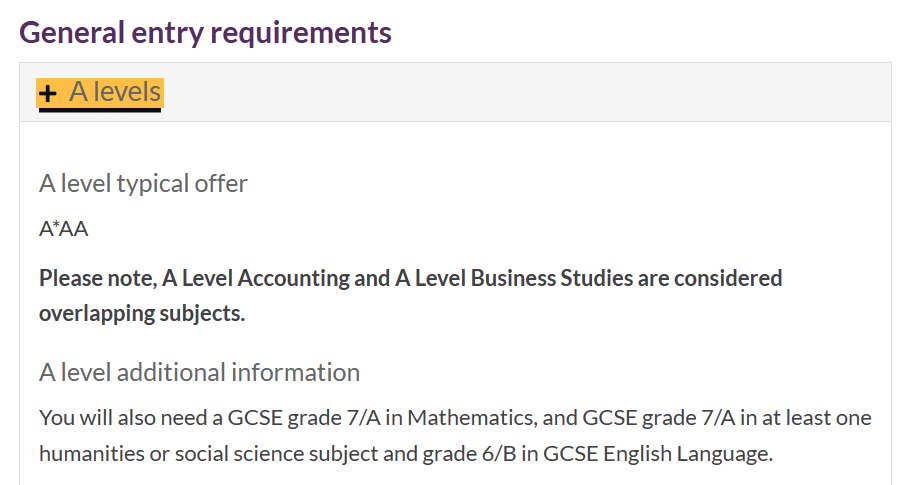
• GCSE: Grade B or 6 in English Language, Grade A or 7 in Mathematics, at least one humanities or social science subject
• A-Level: A*AA
• Suggestions for subject choice: Business Studies, Psychology, Mathematics
Entry requirements of degree in Business Management in University of Leeds

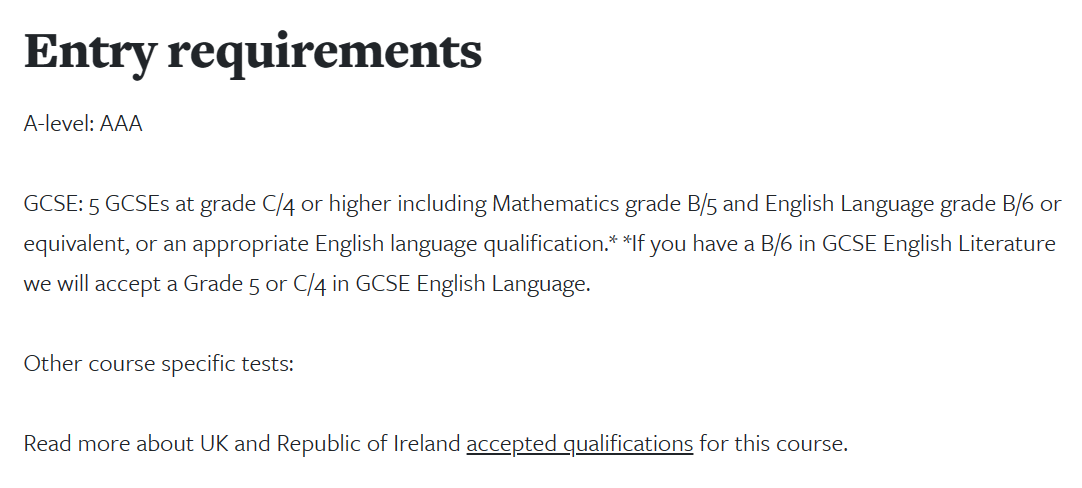
• GCSE: 5 subjects at grade C or 4 or higher including Mathematics grade A or 7 and English Language grade B or 6
• A-Level: AAA
• Suggestions for subject choice: Mathematics, Additional Mathematics, Business Studies
Human resources
This major focuses on the management of talent and other resources in a company. Human resource management relies on impeccable interpersonal skills, whether in the recruitment of employees or in the transfer of talent from one company to another. With a degree in human resources management, you will learn the skills necessary for business development, human resource planning and training, in addition to business management and social work practices.

Basic knowledge: Analytical skills, ability to capture details, interpersonal skills, leadership skills, written and verbal communication skills.
Core courses: Financial Management, Law, Organisational Behaviour, Accounting, Strategic Management, etc.
Future Development: Employment prospects of human resources in the UK are relatively good and employment rates are high, but at the same time there is a high expectation of the overall ability of candidates. Students can work as management consultants, payroll consultants, labour lawyers, office managers, pensions managers and recruiters in the future, with good salaries and a pleasant working environment. There are different types and duties of roles, including staff recruitment (vetting and selection), people management, occupational health and safety, staff training and development, and payroll and benefits, etc.
Entry requirements of degree in Business with Human Resource in the University of Edinburgh

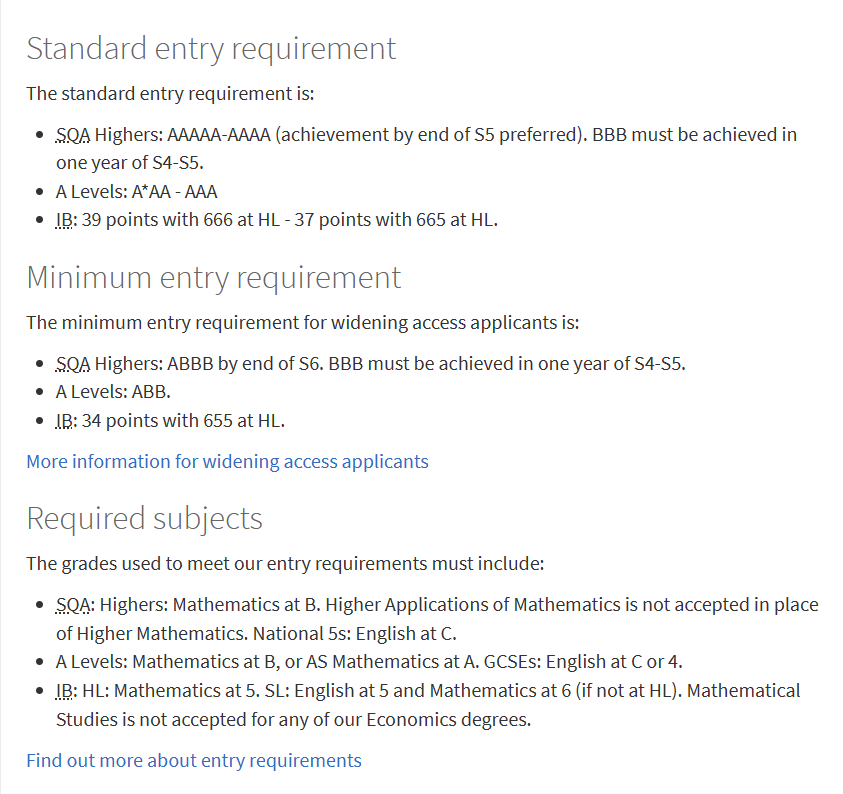
• GCSE: English Language at C or 4, Mathematics at B or 6
• A-Level: A*AA - AAB
• Suggestions for subject choice: Mathematics, Business Studies or Economics
Entry requirements of degree in Management (Human Resources) in the University of Manchester

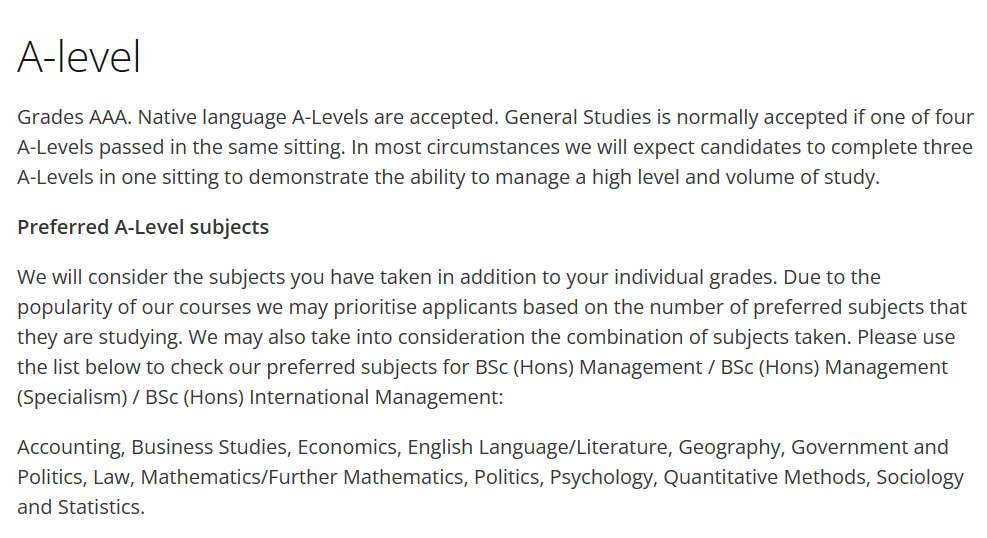
• GCSE: At least grade C or 4 in English Language
• A-Level: AAA
• Suggestions for subject choice: Business Studies, English Language, Economics, Mathematics/Additional Mathematics, Psychology
Economics
This major is usually taught under the Faculty of Social Sciences, or jointly with the Business School. Economics is the study of the allocation of resources, production, distribution, exchange of products, consumption, and the analysis, prediction and stimulation of economic development. In recent years, economics has increasingly been studied with mathematical and statistical models. The undergraduate degree requires the ability to learn to use the principles and methods of economics to accurately manipulate data and provide a theoretical basis for economic management. Studying economics will enable you to prepare better for some analysis of economic trends and predictions related to the industry to improve the operations and performance of your company.

Core courses: Macroeconomics, Microeconomics, Econometrics, Statistics, Mathematics, etc.
Future Development: The career market will demand over 1 million in the next 10 years with work in business management, finance, insurance, sales and other sectors. Economics is not primarily trained for business management, but graduates of this major can become specialised in business management by studying for an MBA. Specific positions include budget analysts, economists, etc.
Entry requirements of degree in Economics in the University of Edinburgh

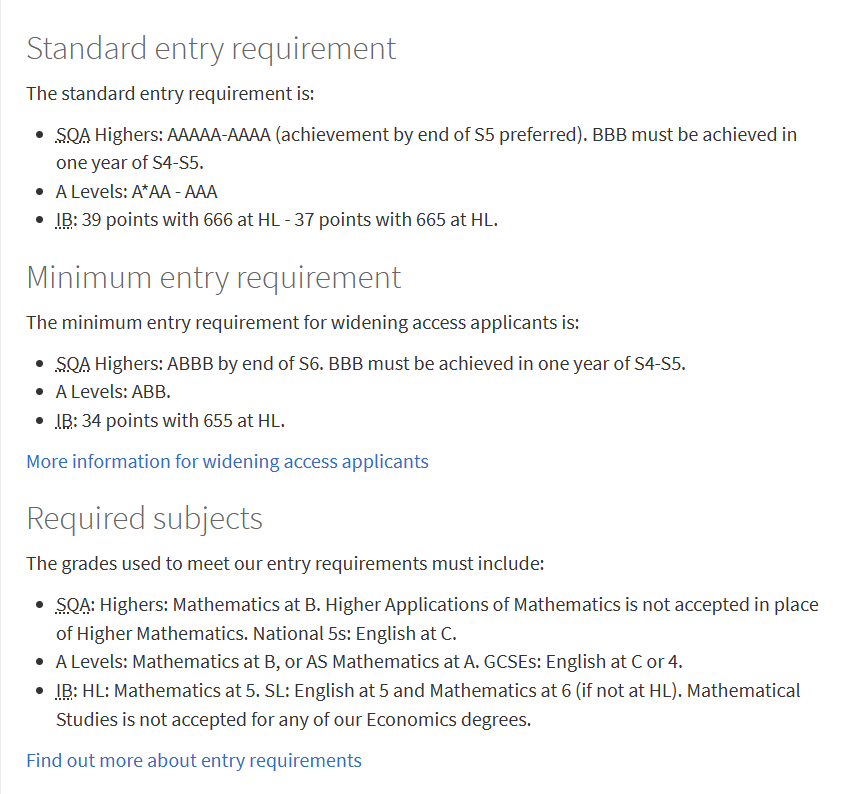
• GCSE: English Language at C or 4
• A-Level: A*AA – AAA, Mathematics at B
• Suggestions for subject choice: Economics, Mathematics
Entry requirements of degree in Economics in the University of Glasgow


• A-Level: AAB - BBB
• Suggestions for subject choice: Mathematics, English Language or Humanities

From information above, we can notice that most business majors have certain requirements for mathematics, especially those related to finance and economics. This requires students to have not only a good foundation in mathematics, but also a basic knowledge of mathematics at university level to prepare them for their future studies. Those business majors that do not require as much mathematics tend to be more likely to require students to have good communication skills (verbal and written), leadership skills and critical thinking. The final choice should be made in the context of our own circumstances.

There are also majors which are not mentioned in this series, but belong to the category of business, such as supply chain management, information systems management, business analysis, hotel management, sports management, international trade, etc. Whatever the choice, it is important to have sufficient information in advance about the corresponding major, such as the entry requirements, the curriculum of the major and the future development, etc.

